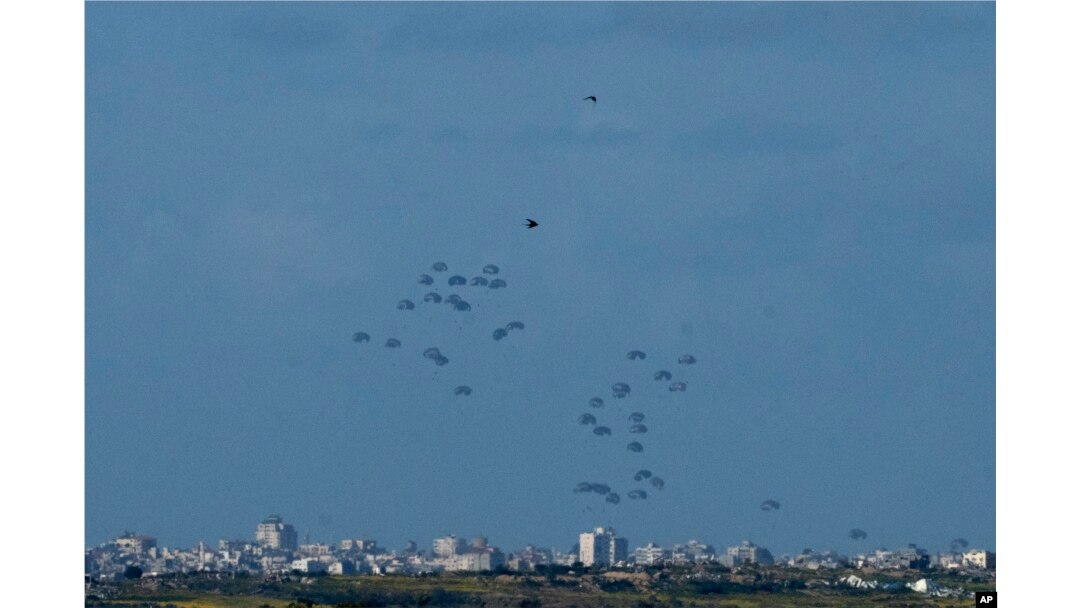With Israel blocking aid to Gaza, where it is carrying out a devastating offensive, insufficient help is reaching the starving population by land — and airdrops carried out by Washington and its allies are not enough to close the gap.
US President Joe Biden "will announce in his State of the Union address that he has directed the US military to undertake an emergency mission to establish a port in Gaza working in partnership with like-minded countries and humanitarian partners," a senior administration official told journalists.
The port will feature a temporary pier that will "provide the capacity for hundreds of additional truckloads of assistance each day," according to the official, who said "this is foreseen to be an operation that won't require US boots on the ground."

FILE —Parachutes drop supplies into the northern Gaza Strip, as seen from southern Israel, March 7, 2024.
The official cautioned that "to really address the urgent needs of the civilian population in Gaza and to enable humanitarian partners to safely distribute life-saving aid throughout Gaza at the scale that is needed, it is essential that we see a temporary ceasefire in Gaza."
But Israel and Palestinian militant group Hamas have yet to agree to a new pause in the fighting.
Hamas's delegation voiced dissatisfaction Thursday with Israeli responses to negotiations so far and left Cairo, where talks had been taking place, for consultations with the movement's leadership in Qatar.
Gaza has faced relentless bombardment by Israel since Hamas launched a cross-border attack on October 7 that resulted in about 1,160 deaths, most of them civilians, according to an AFP tally based on official Israeli figures.
FILE —Palestinians mourn for relatives who were killed in overnight Israeli air strikes on the Rafah refugee camp in the southern Gaza Strip, at Rafah's Najjar hospital on February 27, 2024.
Israel's retaliatory operations in Hamas-controlled Gaza have killed more than 30,800 people, mostly women and children, according to the territory's health ministry.
The amount of aid brought into Gaza by truck has plummeted during five months of war, and Gazans are facing dire shortages of food, water and medicine.
'Acute food insecurity'
American C-130 cargo planes on Thursday "dropped over 38,000 meals, providing life-saving humanitarian assistance in Northern Gaza to enable civilian access to critical aid," the US Central Command (CENTCOM) said, announcing Washington's third such drop in less than a week.
"The combined, joint operation included US Air Force and Jordanian C-130 aircraft and US Army soldiers specialized in aerial delivery of US humanitarian assistance supplies," CENTCOM said.
"These airdrops are part of a sustained effort, and we continue to plan follow on aerial deliveries," it added.
FILE— Palestinian children receive cooked food rations as part of a volunteer youth initiative in Rafah in the southern Gaza Strip, on March 5, 2024, amid widespread hunger in the besieged Palestinian territory.n
A statement from Jordan's military said Belgian, Dutch, Egyptian and French planes also took part in the airdrop.
The United States launched its first airdrop of food into Gaza on Saturday, providing more than 38,000 meals then also, and dropped more than 36,000 on Tuesday.
But the number of people in need of aid in Gaza is much greater than could be fed by airdrops alone.
According to the World Food Program, "the conflict in Gaza has left the entire population of 2.2 million people in 'crisis' or worse levels of acute food insecurity."
"Hundreds of thousands of people are crammed into overcrowded shelters and hospitals, with food and water running out," it says.
Pentagon spokesman Major General Pat Ryder said earlier this week that Washington wants "to see more aid being delivered via ground routes."
"This is part of the discussion that we're having with the Israelis in terms of how can they work to ensure that those routes are open, and that aid can get in quicker," Ryder said.


